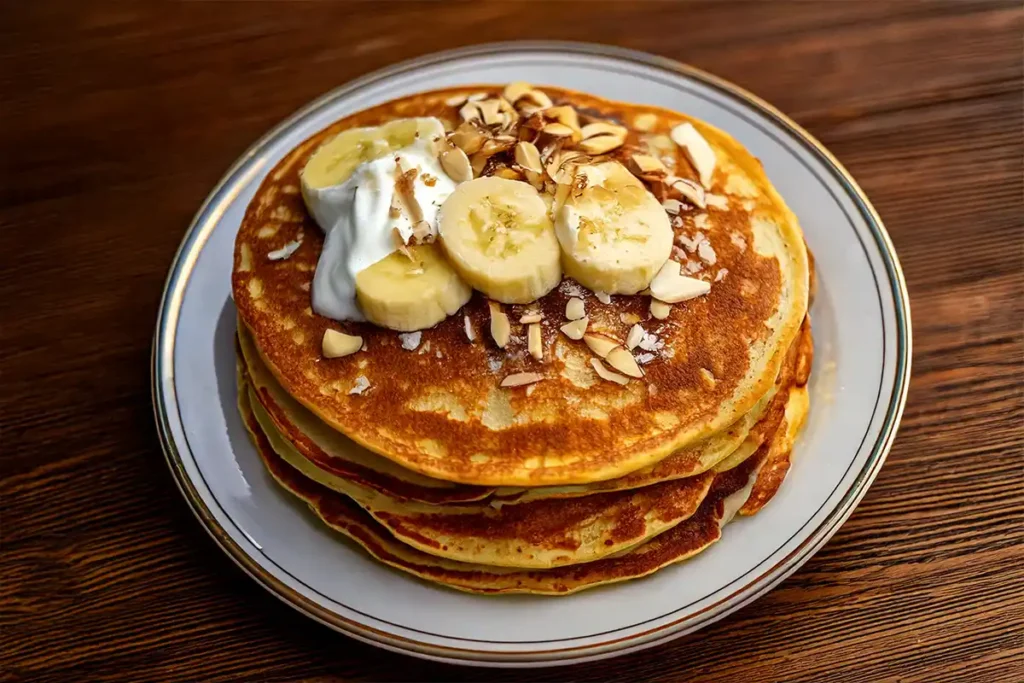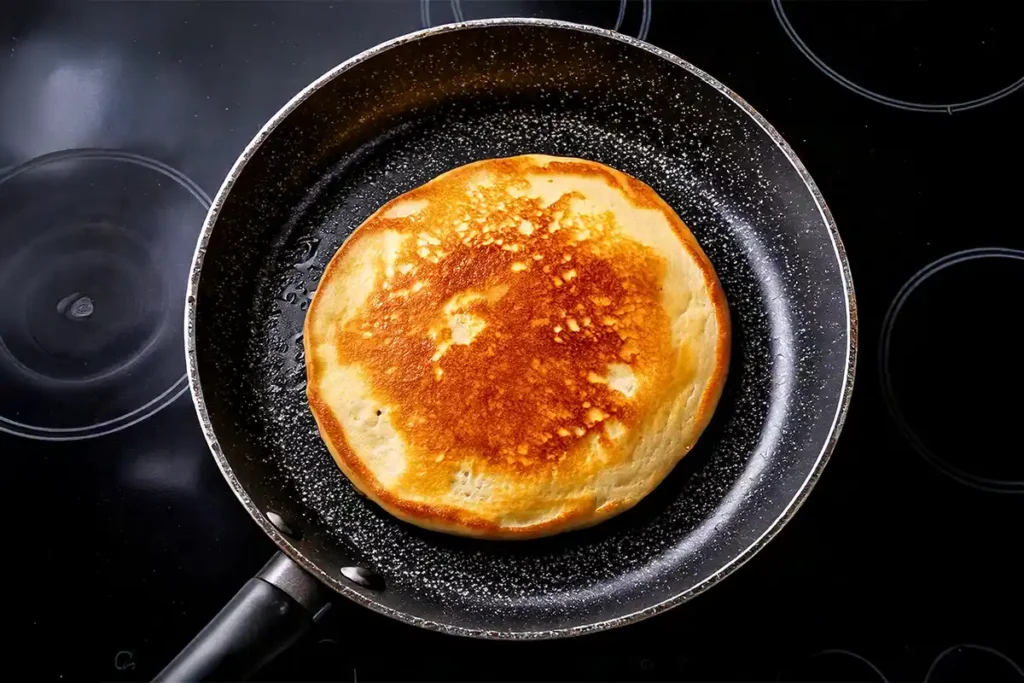Is It OK to Have Pancakes for Breakfast? This article explores the nutritional side of enjoying pancakes, offering balanced views and delicious options.
The Pancake Question: Are They a Good Start?
Many people wonder if pancakes are suitable for breakfast. They are a popular choice, yet their place in a healthy diet is often questioned. Pancakes are typically made with flour, milk, and eggs, then cooked on a griddle. However, the additions, like syrup, can affect their overall value. So, can we naturally enjoy them without guilt? Let’s look closer.
What Makes Pancakes a Common Breakfast Choice?
Pancakes are a breakfast staple in many homes. Their fluffy texture and sweet taste make them a treat. They are quick to make, which is great on busy mornings. However, not all pancakes are created equal. Ingredients and toppings can vastly change their nutritional profile. Naturally, some options are better than others.
Understanding the Basics of Pancake Nutrition
Pancakes are mostly carbohydrates. They also contain some fat and a little protein. The flour used usually determines the carbohydrate content. For example, whole wheat flour provides more fiber than white flour. The amount of sugar and fat used also affects how healthy they are. Therefore, it is important to pay attention to these factors.
The Impact of Ingredients on Your Pancake Choice
The type of flour you choose for pancakes matters greatly. Refined white flour has fewer nutrients compared to whole wheat flour. Therefore, using whole wheat or oat flour can add fiber. This helps you feel full longer. Furthermore, adding things like fruits can bring extra nutrients and flavor.
Flour Choices: White vs Whole Grain
- White flour: This is common but lacks fiber. This can cause a quick sugar spike in your blood.
- Whole wheat flour: This option contains more fiber and nutrients. It is a better choice for maintaining stable blood sugar levels.
- Oat flour: It is another good alternative that adds fiber and a slightly nutty flavor. Additionally, it can be a good choice for those wanting to change things up.
The Role of Sugar and Sweeteners
The amount and type of sweeteners used can have a big impact. Naturally, too much sugar is not good for anyone. Using a little maple syrup or honey is fine. But, always aim for moderate amounts. You can also use fruit to add sweetness instead of lots of sugar. Ultimately, the goal is to make pancakes taste good without overdoing the sugar.
Fats and Oils in Pancake Recipes
The fats used in pancake recipes can also affect their health. Using a little butter or oil is often needed for cooking. However, using too much can add extra calories. Generally, you should use fats sparingly. Moreover, choose healthier options such as olive oil or coconut oil where possible.
Toppings and Their Contribution to Your Breakfast
Toppings can make or break a pancake breakfast. Choosing wisely is essential. Fresh fruit is a great choice. Furthermore, using a small amount of nuts adds protein and healthy fats. Syrup and butter should be used in moderation. Indeed, the right toppings can make pancakes more nutritious and satisfying.
Fruits: A Naturally Sweet Addition
Fruits such as berries, bananas, and sliced apples are perfect toppings. They offer natural sweetness, fiber, and vitamins. Moreover, they add moisture and color to your plate. They are compatible with most pancake flavors, making them a superb choice. Therefore, fruits are a healthy and delicious addition.
Nuts and Seeds: Adding Crunch and Nutrients
A small amount of nuts or seeds can improve the pancake’s nutritional profile. They bring healthy fats, protein, and extra crunch. Sunflower seeds, chopped almonds, or walnuts are good options. Accordingly, these are small changes that can make a big difference.
Syrups and Other Sweet Toppings: Watch the Sugar Content
Syrups like maple syrup or honey should be used sparingly. They often contain a lot of added sugar, which contributes to unwanted calories. If possible, choose low sugar or sugar-free options. Generally, be mindful of the portion size of these sweet additions. Hence, you can keep the balance healthy.
Other Topping Alternatives
There are many unique toppings besides the normal choices. Yogurt, a light dusting of cinnamon, or a little lemon zest are also good. Comparatively, these choices offer different flavors. In addition, they help to reduce the reliance on sugary syrups. Thus, you can make your pancakes varied and healthy.

Is it okay to eat pancakes if you want to be healthy?
It is possible to enjoy pancakes while eating healthy. The key lies in making informed choices about the ingredients and toppings. Ultimately, it’s about finding a good balance. You can make pancakes a part of a nutritious meal. Furthermore, planning meals around a pancake breakfast can help with maintaining a balanced diet.
Strategies for Healthier Pancake Preparation
Making healthier pancakes involves a few simple steps. First, opt for whole grain flours. Second, reduce the amount of added sugar. Third, use healthy fats. And finally, choose fresh and nutritious toppings. With these changes, pancakes can be a great breakfast option.
Portion Control and Frequency
Eating pancakes in moderation is essential. Even healthier versions should not be eaten in excessive amounts. Naturally, portion control is key for maintaining a healthy weight. Therefore, enjoy pancakes occasionally and within a balanced meal plan.
Balancing Pancakes with Other Nutritious Foods
Pancakes alone might not provide all the nutrients needed for a complete meal. However, you can pair them with other protein-rich foods. For example, add some plain yogurt or a side of fruit. Accordingly, you can create a balanced breakfast that keeps you full longer.
When Is the Best Time to Eat Pancakes?
The best time to enjoy pancakes is a personal preference. Many people choose to have them for breakfast. However, they can also be eaten as a brunch or a treat on the weekend. Ultimately, the key is to enjoy them as part of a balanced diet.
Pancakes for Breakfast
Pancakes are most commonly eaten for breakfast. They offer quick carbohydrates for energy to start your day. Additionally, you can pair them with protein and fruit to make a complete meal. Therefore, they can be a satisfying breakfast option, particularly if you are active.
Pancakes as a Brunch Option
Pancakes are also great for brunch. They provide a more relaxed option for a weekend meal. Moreover, you can include more toppings and enjoy them with family and friends. Thus, pancakes can be a social and enjoyable meal choice.
Pancakes as a Treat
Pancakes can be enjoyed as an occasional treat. Eating them in smaller portions and with healthy toppings makes them guilt free. Hence, you can enjoy pancakes without disrupting your diet plans.
Simple and Healthy Pancake Recipe
Here is a simple recipe to make healthy pancakes. This recipe uses whole wheat flour and less sugar. It is designed to be naturally tasty and nutritious.
Ingredients
- 1 cup whole wheat flour
- 1 teaspoon baking powder
- 1/2 teaspoon baking soda
- 1/4 teaspoon salt
- 1 tablespoon sugar (or alternative sweetener)
- 1 egg
- 1 cup milk (or dairy-free alternative)
- 2 tablespoons melted coconut oil or olive oil
- Optional: 1 teaspoon vanilla extract
Detailed Step-by-Step Cooking Instructions
- Combine the Dry Items: In a medium bowl, mix together the whole wheat flour, baking powder, baking soda, salt, and sugar (or alternative sweetener). Whisk well to make sure everything is mixed evenly.
- Mix the Wet Items: In a separate bowl, whisk together the egg, milk (or a dairy-free option), melted coconut oil or olive oil, and vanilla extract if you are using it. Mix them until everything is well combined.
- Mix Wet and Dry: Slowly pour the wet ingredients into the bowl with the dry items, mixing them all together using a spatula. Mix until everything is combined. Do not overmix the batter. A few lumps are acceptable in the batter.
- Heat the Pan: Place a non-stick pan or griddle over medium heat. Lightly grease it with a little more oil or butter. Make sure the pan is hot enough by flicking a drop of water onto it. It should sizzle a bit.
- Cook the Pancakes: Pour about ¼ cup of batter onto the hot pan for each pancake. Allow the pancakes to cook for about 2-3 minutes, or until small bubbles appear on the surface. Use a spatula to flip the pancakes. Cook the other side for 1-2 minutes, or until they turn golden brown.
- Serve: Take the pancakes off the heat and stack them on a plate. Serve them immediately with your favorite toppings. Naturally, you can use the fruit and nuts as suggested earlier.

Nutritional Information
per 100g of cooked pancakes (approximate):
| Nutrient | Amount |
| Calories | 180 |
| Carbohydrates | 28g |
| Protein | 6g |
| Fat | 5g |
| Fiber | 3g |
Pancakes for Breakfast: Key Considerations
Enjoying pancakes for breakfast is certainly compatible with a balanced diet. The key is to make smart choices about ingredients, toppings, and portion sizes. Furthermore, balance your meal with other nutrient-rich foods. Therefore, you can enjoy pancakes as part of a healthy meal.
The Importance of a Balanced Diet
No single food can provide all the nutrients needed. Therefore, a balanced diet with a variety of foods is crucial. Pancakes, when made with whole grains and healthy toppings, can fit into such a plan. Ultimately, it’s about moderation and making healthy choices most of the time.
Listening to Your Body
Each person’s nutritional needs are unique. Generally, listen to your body and how it reacts to certain foods. Pancakes might work well for some, but not as well for others. Accordingly, it is important to understand your individual needs and preferences.
Enjoying Food Without Guilt
Food should be enjoyed and not associated with guilt. Pancakes can be a part of this enjoyment when consumed in a moderate way. Hence, allow yourself to enjoy pancakes when you want. Naturally, combine them with a healthy overall eating plan.
Conclusion: Enjoying Pancakes Naturally
Pancakes can indeed be part of a healthy breakfast if done right. Focus on whole grains, less sugar, and healthy toppings. Use them in moderation, and balance your meal with other nutritious foods. Ultimately, the key is to make smart food choices.
FAQs Related To Is It OK to Have Pancakes for Breakfast?
Are pancakes good or bad carbs?
The quality of carbohydrates in pancakes varies based on the recipe. Pancakes made with white flour are considered simple carbohydrates and can cause quick blood sugar spikes. Whole-grain pancakes, on the other hand, are complex carbohydrates and provide fiber, offering a more sustained energy source. Therefore, choose whole grains where you can.
What is the best time of day to eat pancakes?
Many people enjoy pancakes for breakfast. However, you can also eat them as a brunch or a treat on the weekend. Ultimately, the best time to eat pancakes is a matter of personal preference and timing.
Is it okay to eat pancakes on a diet?
Yes, you can eat pancakes while on a diet. Focus on making healthier pancakes with whole grains, less sugar, and nutritious toppings. Moreover, watch your portion sizes and balance your meal with other protein-rich foods to ensure that it is compatible with your goals.
Are pancakes for breakfast healthy?
Pancakes can be part of a healthy breakfast. Choose whole grain flours, reduce sugar, use healthy fats, and top them with fresh fruit and nuts. However, consider the ingredients and keep portion sizes moderate to maintain a balanced diet.

